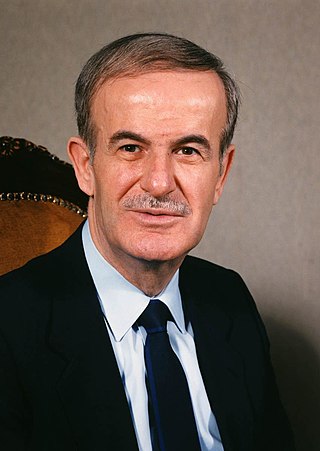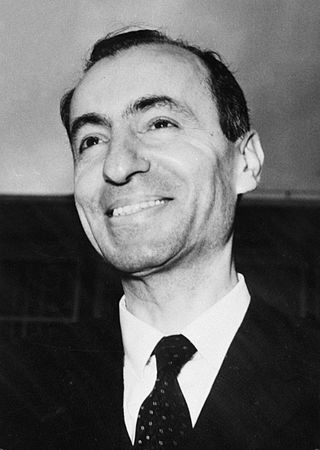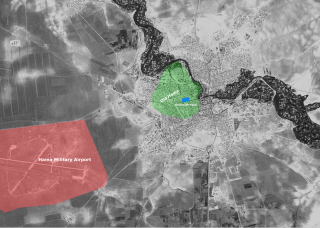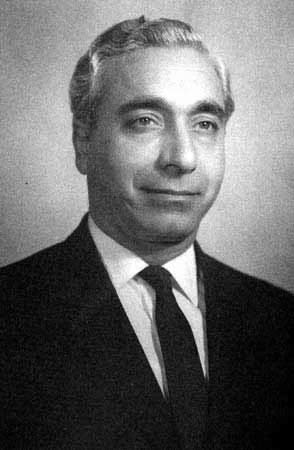
Hafez al-Assad was a Syrian statesman and military officer who was the 18th president of Syria from 1971 until his death. He was previously prime minister of Syria from 1970 to 1971, as well as regional secretary of the regional command of the Syrian regional branch of the Arab Socialist Ba'ath Party and secretary general of the National Command of the Ba'ath Party from 1970 to 2000. Hafez al-Assad was a key participant in the 1963 Syrian coup d'état which brought the Syrian regional branch of the Arab Socialist Ba'ath Party to power in the country.

Michel Aflaq was a Syrian philosopher, sociologist and Arab nationalist. His ideas played a significant role in the development of Ba'athism and its political movement; he is considered by several Ba'athists to be the principal founder of Ba'athist thought. He published various books during his lifetime, the most notable being The Battle for One Destiny (1958) and The Struggle Against Distorting the Movement of Arab Revolution (1975).

Salah al-Din al-Bitar was a Syrian politician who co-founded the Arab Baʿth Party with Michel Aflaq in the early 1940s. As students in Paris in the early 1930s, the two formulated a doctrine that combined aspects of nationalism and socialism. Bitar later served as prime minister in several early Ba'athist governments in Syria but became alienated from the party as it grew more radical. In 1966 he fled the country, lived mostly in Europe and remained politically active until he was assassinated in Paris in 1980 by unidentified hitmen linked to the Assad regime.

Amin al-Hafiz, also known as Amin Hafez was a Syrian politician, general, and member of the Ba'ath Party who served as the President of Syria from 27 July 1963 to 23 February 1966.

The 1966 Syrian coup d'état refers to events between 21 and 23 February during which the government of the Syrian Arab Republic was overthrown and replaced. The ruling National Command of the Arab Socialist Ba'ath Party were removed from power by a union of the party's Military Committee and the Regional Command, under the leadership of Salah Jadid.

The 1963 Syrian coup d'état, referred to by the Syrian government as the 8 March Revolution, was the successful seizure of power in Syria by the military committee of the Syrian Regional Branch of the Arab Socialist Ba'ath Party. The planning and the unfolding conspiracy was inspired by the Iraqi Regional Branch's successful military coup.

The Corrective Movement, also referred to as the Corrective Revolution or 1970 coup, is the name of a bloodless coup d'état led by General Hafez al-Assad on 13 November 1970 in Syria. Assad proclaimed to sustain and improve the "nationalist socialist line" of the state and the Ba'ath party. Ba'ath party adopted an ideological revision, absolving itself of Salah Jadid's doctrine of exporting revolutions. The new doctrine placed emphasis on defeating Israel, by developing Syrian military with the support of Soviet Union. Assad would rule Syria until his death in 2000, after which he was succeeded by his son Bashar al-Assad.

The 1964 Hama riot was the first significant clash between the newly installed Ba'ath Party leadership of Syria and the Muslim Brotherhood. It occurred in April 1964, after the 1963 Ba'athist coup d'état. The insurrection was suppressed with heavy military force, resulting in 70-100 mortal casualties and partial destruction of the old Hama city neighborhoods. Hama continued to be a center of Islamists and a focal point of the 1976-1982 Islamist uprising in Syria.

The Muhammad Naji al-Otari government was the second Syrian government formed during the presidency of Bashar al-Assad. It was announced on 10 September 2003, by Prime Minister Muhammad Mustafa Mero. The cabinet lasted until 29 March 2011, and resigned in the wake of the Syrian Civil War.

Mansur al-Atrash was a Syrian politician and journalist. Together with fellow university students, Atrash became a founding member of the Ba'ath Party and its Syrian regional branch in 1947. During the presidency of Adib Shishakli (1951–54), he became an anti-government activist and was imprisoned twice, only to be released in an unsuccessful attempt by Shishakli to gain the support of Atrash's father, Sultan. In the year Shishakli was overthrown, Atrash was elected to parliament and turned down an offer to serve in Said al-Ghazzi's government. During the period of the United Arab Republic (1958–61), Atrash became a strong supporter of Egyptian president and pan-Arab leader Gamal Abdel Nasser. He opposed Syria's secession from the UAR and turned down offers to serve in successive separatist governments in protest.

Mohammed Ziad al-Hariri is a former prominent Syrian Army officer. A staunch Arab nationalist, he supported the union between Syria and Egypt in 1958, opposed Syria's secession from it in 1961 and served as the chief leader of the coup d'état that toppled the secessionist government in March 1963. Politically independent from the Nasserists and their Ba'athist rivals, Hariri served as the army's chief of staff following the coup and was briefly defense minister until being dismissed during a wide-scale purge of non-Ba'athists from the military. He retired from political activity soon afterward.
Muhammad al-Sufi was a field marshal in the Syrian Army, who played a role in the 1963 Syrian coup d'état and briefly served as Defense Minister between March and May of that year. Politically a Nasserist, he was sidelined by Ba'athist rivals in the military and departed the political scene before returning to Syria in the 1990s.

Salim Hatum was a Syrian Army officer who played a significant role in Syrian politics in the 1960s. A member of the Syrian Regional Branch of the Arab Socialist Ba'ath Party, he was instrumental in the 1966 Syrian coup d'état that toppled the government of Amin al-Hafiz, also a Ba'athist. That same year he launched an insurrection from his home region of Jabal al-Druze against his colleagues who formed the new government but sidelined him from any major position. He fled Syria amid a warrant for his arrest, but returned in 1967 and was subsequently jailed and executed.

The Ministry of Endowments or Ministry of Awqaf is a department of the Government of Syria.

The First Salah al-Din al-Bitar Government ruled Syria from March to May 1963. The Cabinet of Syria was led by then-Prime Minister Salah al-Din al-Bitar. This government was the 60th since Syria gained independence from the Ottoman Empire in 1918 and the country's first Baathist government.

The Second Salah al-Din al-Bitar Government ruled Syria from May to August 1963. The Cabinet of Syria was led by then-Prime Minister Salah al-Din al-Bitar. This government was the 61st since Syria gained independence from the Ottoman Empire in 1918.

The Third Salah al-Din al-Bitar Government ruled Syria from May to October 1964. The Cabinet of Syria lead by then-Prime Minister Salah al-Din al-Bitar. This government was the 62nd since Syria gained independence from the Ottoman Empire in 1918.

The Fourth Salah al-Din al-Bitar Government ruled Syria from May to October 1964. The Cabinet of Syria lead by then-Prime Minister Salah al-Din al-Bitar. This government was the 73rd since Syria gained independence from the Ottoman Empire in 1918.

The Second Amin al-Hafiz Government ruled Syria from October 1964 to September 1965. The Cabinet of Syria lead by then-Prime Minister Amin al-Hafiz. This government was the 65th since Syria gained independence from the Ottoman Empire in 1918. It was formed on 4 October 1964 by Decree No. 905 and dissolved on 22 September 1965 by Decree No. 2127.

The Fifth Salah al-Din al-Bitar Government ruled Syria from January to February 1966. The Cabinet of Syria lead by then-Prime Minister Salah al-Din al-Bitar. This government was the 73rd since Syria gained independence from the Ottoman Empire in 1918.















